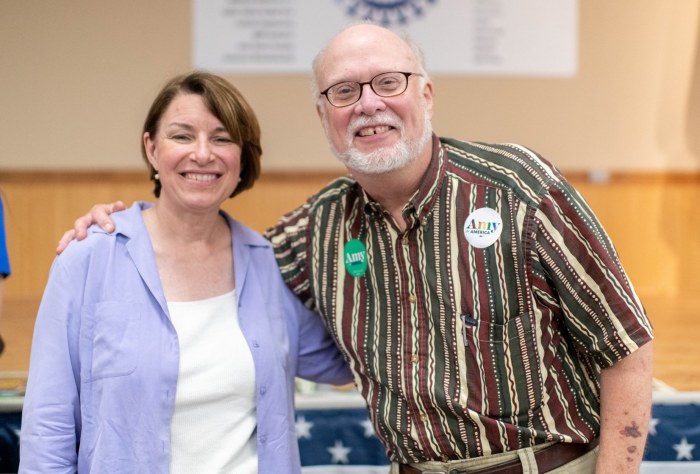Bill Witt represented part of Black Hawk County in the Iowa House for ten years and is a well-known advocate for improving health care services and environmental causes. -promoted by Laura Belin
While the big political noise machines have traded barrages in a host of high-profile battles over border security, student debt, the Affordable Care Act, Afghanistan, and more, U.S. Senator Amy Klobuchar has quietly, and with her customary adroitness, slipped around the flanks of the clanking, clattering behemoths and planted her standard on strategic, long-term high ground: the security and health of America’s seniors.
Ten thousand Americans join Medicare every day. Their parents, meanwhile, are aging into their eighties and nineties, with growing needs for in-home and institutional care, for more—and more costly—medicines and treatments, and with their increasing vulnerability, for safety from the talons of heartless scammers who will gleefully cheat them of every widow’s mite of their savings and self-esteem.
Senator Klobuchar’s plan aims at some of the big targets that are already subjects of nationwide debate, such as preserving and enhancing Medicare and Social Security. But she also looks to strengthen the underpinnings that support greater access to services, employing more care providers, bolstering research through the National Institutes of Health and collaborative research with universities and national benchmark long-term care providers, higher quality services, and enhancing community and family supports.
Iowans should keenly note provisions to alleviate immediate and growing problems in our country and within our families:
1) According to recent reports from the Iowa Department of Human Services, Des Moines Register, Iowa Caregivers, and others, Iowa will face a shortfall of over 20,000 care providers at all levels, from certified nursing assistants to medical doctors within the next decade.
2) Demographic shifts, such as more elderly people with higher care needs and fewer family members nearby, tighter reimbursement methods, health systems consolidation, declining numbers of health professionals (especially in rural areas), and scant and disappearing rural public transit will drive the closure of seventeen to 22 hospitals in smaller communities across the state.
3) These factors, plus lack of working capital to invest in workforce recruitment, the most modern technologies and training, will force 40 percent or more of Iowa nursing homes to close by 2028. Senator Klobuchar’s plan would address these issues head on with the same can-do, Midwestern attitude that is her trademark.
Klobuchar focuses on tackling Alzheimer’s and other cognitive impairments to highlight her comprehensive approach. Dementias and other cognitive losses will affect 14 million Americans over the coming 30 years: that’s a number that makes for policy imperatives. But her dedication to solving this problem is also personal: her 91-year-old father receives care for Alzheimer’s.
Our family has been fortunate. My mother and my mother-in-law both needed 24-hour skilled care as they neared the ends of their long lives. Each had enough means to pay for her care. My mother-in-law had a loving and highly capable daughter to handle all her affairs, other equally loving children who came regularly, from all over the U.S., to love her (and provide some respite for my wife and me).
Every family and every community for 60 to 100 miles around could be connected to the social-medical services powerhouse that we have in Cedar Falls-Waterloo, or in the Cedar Rapids-Iowa City corridor or Ames-Des Moines. Senator Amy Klobuchar is the leader who can help not just Iowa but all America have equal access to these services. She has the vision, the Midwestern get-it-done-right values, and the quiet, purposeful, uplifting leadership skills we need in our nation’s leader.
Let me offer one last way I personally relate to her solutions: making long term care more affordable through tax credits and long term care insurance. When my mother was in 24-hour nursing care, her monthly bills totaled over $7,000. She had her pension, her Social Security, her small investments; altogether her income from them would have covered about half her costs. Fortunately, she’d been a savvy senior who signed up for long term care insurance, and it paid $3,000 per month when she needed it. And that made the difference between care in a top-flight facility versus a “Medicaid feedlot.”
In another of her plan’s strategic insights, Klobuchar would offer incentives to increase participation in long-term care insurance, helping more seniors maintain financial independence with more choices for care, while reducing Medicaid costs.
Klobuchar has proposed the best program for seniors (myself included) that I’ve seen, and I urge you to study it in detail here.
Bill Witt served as an Iowa State Representative from 1993 to 2002. For nine of those ten years, he crusaded for reform of Iowa’s Medicaid reimbursement system. In 2001, he co-led a bipartisan, bi-cameral coalition that finally ”put the money where the care is”; that care-needs-based system continues today. Following his retirement from the legislature, he kept advocating for the elderly and those with disabilities at the state and national levels. He also served for many years on the Board of Directors of the Western Home Communities of Cedar Falls, one of America’s benchmark continuum-of-care communities, retiring as Executive Chair and Immediate Past Chair in 2019.
Top photo of Senator Amy Klobuchar with Bill Witt provided by the Klobuchar campaign and published with permission.
Editor’s note: Bleeding Heartland welcomes guest posts related to the Iowa caucuses, including but not limited to candidate endorsements. Please read these guidelines and contact Laura Belin if you are interested in writing.


1 Comment
Please attend my event in Waterloo Thursday!
I am hosting a community discussion regarding these larger systemic issues next Thursday, August 8th at 10 am at the Waterloo Public Library as a function of the Waterloo commission on Human Rights. This community discussion will include a presentation and a guided dialogue.
Please join us in community conversation!
Registration: https://waterloo-commission-on-human-rights.mobilize.io/registrations/groups/34389
RSVP: https://waterloo-commission-on-human-rights.mobilize.io/main/groups/34389/lounge/events/35397
Keegan Smith Fri 2 Aug 3:55 PM